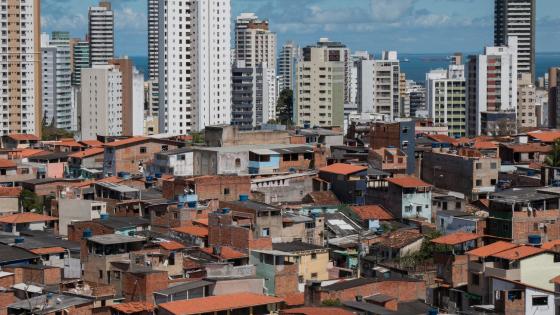The “Development and the crisis” theme in Vox’s Global Crisis Debate provides a refreshing counterweight to current discussions’ overwhelming emphasis the effect of the crisis on developed nations. The emphasis in these discussions is so unbalanced that – as Tom Coupé found out interviewing participants at the GDN – most of those coming from developing countries do not even expect a recession to occur in their country. Even if their expectations are correct – and I suspect that they will rapidly adjust over the coming months – the crisis promises to radically reconfigure relationships between developing and developed countries. The focus of the current discussion in the developing world should be precisely what to do with and about this reconfiguration.
The dawn of a new era?
Dani Rodrik kicked off the discussion on an optimistic note. For developing countries, he argued, there is a silver lining to the crisis. It comes from the fact that developed countries will emerge weakened, with a reduced capacity to impose their views on international economic institutions. Developing countries can step in to fill the gap as their relative weight and importance rises. They have an extraordinary opportunity to push for greater policy space to carry out their national development strategies, a more transparent international financial system, and improved management of capital account flows – such as pushing for the adoption of a Tobin tax to reduce financial volatility – while also accepting the responsibilities that will come with their enhanced policy-setting power.
As Nancy Birdsall and Katharina Pistor pointed out in their comments, the strengthening of developing countries is only one of several potential scenarios. Developing countries may not see that it is in their interest to reassert power over already battered international financial institutions. One response may be progressive “global disengagement”, where developing and developed countries alike concentrate on domestic policy issues to the detriment of any type of international cooperation.
Two key assumptions that are implicit in Rodrik’s vision are that political power in the international arena is a positive function of the strength of your economy and that developing countries will be less adversely hit by the crisis because it originated in developed countries. The first of these is probably true, but the second one is more open to question. Even relatively mild economic crises in developed countries have a habit of turning nasty when they make their way south. When Paul Volcker’s Fed raised interest rates in 1980, it set off a three-year recession in the US. In the developing world, the ensuing period became known as the “lost decade”, and for several developing countries, it is more adequately characterised as a lost quarter-century. As the old adage says, when the US sneezes, the developing world catches a cold.
This paradoxical phenomenon is less an expression of global realpolitik than a result of a simple economic fact. Negative demand shocks in a large country generate an offsetting positive wealth effect by improving the country’s terms of trade, and therefore consequently lead to an impoverishment of its trading partners. This is what happened during the lost decade. Between 1980 and 1992, the terms of trade of Latin American countries fell by 41%. It is also what happened during the Great Depression, when the purchasing power of the region’s exports fell by 57% in a space of just four years. And, if the price that I pay at the pump is any indication, it is exactly what is happening today.
This is not to say that developing countries may not be able to gain the policy space that Rodrik advocates. The 1930s were precisely the period of the emergence of spontaneous import substitution in much of the developing world. The same strategies would be implausible and impractical in today’s world, but my view is that the collapse of the system of global links whereby developed countries bought manufactured goods from Asia while Asia bought primary commodities from Latin America and Africa could be filled in by greater prominence of intra-regional economic links within developing nations. The failure of global mechanisms of cooperation need not lead to complete isolationism but rather a growing reliance on regional institutions where the commonality of interests and problems makes it easiest to reach and maintain agreements. One key question is whether a more effective approach for developing nations would be to strengthen regional cooperation mechanisms, as José Antonio Ocampo suggests, rather than try to assert their influence in global ones.
It’s the financial intermediation, stupid
Ricardo Hausmann and Guillermo Rozenwurcel point to a central but too often overlooked aspect of the crisis, which is that its origin in the financial sector has significant real implications. The fact is that financial intermediation has collapsed, big time. You either rebuild it by recapitalising banks – as Hausmann proposes – or you start coping with the fact that you were living in a bubble and that you are now poorer – as Rozenwurcel argues.
A collapse in financial intermediation is a shift inwards of the production possibilities frontier. It is not clear that we can be sanguine about printing money unless we are sure that our efforts to rebuild this capacity will be effective. While recapitalisation is important, it is only part of the story. Recapitalised banks have to be willing to lend, and in a scenario where no one knows a financial asset’s value, this could be an extremely difficult goal to achieve. The problem is aggravated by the fact that, after two decades of financial liberalisation, the failed banks of the developed world are also, in many cases, the banks of the developing world.
Concerted international action may allow multilateral development banks to recapitalise and lend to governments, but this will be only partially effective at best if there is no one willing to lend to private firms in developing countries. Avoiding a massive credit crunch will require much more active involvement by states in the allocation of credit.
The conventional wisdom that (given the correct incentives and regulation) you can have the private sector do anything you want better than the state is useless when you are in the midst of an expectations-driven crisis. Policymakers in developing and developed countries must take seriously the alternative of becoming very actively involved in the management of the financial sector if they want to get out of the crisis, even if it means uttering “nationalisation”.
The Talented Mr. Ponzi
There is a paradox to the current crisis. Everyone agrees that it was caused by over-borrowing by Americans who were living beyond their means. But everyone continues to lend to the US, because they don’t know where else to put their money. Of course, the US is happy to keep on printing money if there are wiling takers. But, as Ulrich Volz and Mohammed Ariff point out, this distorted allocation of world savings is ultimately damaging to the prospects for recovery in the developing world.
Indeed, there is a name for the continuous flight to the dollar in the context of the current crisis. Everyone is investing in the dollar because they believe it will hold its value. As investors flee to the dollar, the US can print more greenbacks and maintain its value precisely because of this belief. Effectively, it is paying off previous investors (who see their trust in the currency’s stability confirmed) through the willingness of new investors to buy in. This is eerily reminiscent of what Mr. Charles Ponzi did in 1903, and ever since he first tried it, it has never turned out well.
José Antonio Ocampo and Dani Rodrik propose a simple way to expend world liquidity without printing greenbacks – print more special drawing rights. This benefits everyone… except the United States, which benefits from its ability to print money that the whole world wants (for now). So will the IMF do it? I’m not so sure. But there’s no reason why the IMF has to have a monopoly on the issuance of a global reserve currency, and it may be time for developing countries to think about going it on their own.
The politics of cooperation and isolationism
Global international cooperation requires smart domestic politics. As Jeff Frieden argues, politicians always face strong incentives to pursue isolationist policies, and these incentives become greatest when voters are angry about losing their jobs. National governments need to be very mindful of what is happening to income distribution in order to make sure that they maintain a political base of support that allows them to keep markets open and global cooperation alive.
There is quite a bit of alarm about the prospects of protectionism rearing its ugly head again. Putting aside disagreements about its actual ugliness, I don’t think this is such a big issue. The progressive trade liberalisation that occurred over the past forty years was achieved though the construction of a web of multilateral and bilateral agreements that are very costly to exit. Even radically left-wing politicians like Hugo Chávez haven’t even raised the possibility of withdrawing from the WTO.
Rather, I think that the dangers are elsewhere, and – at least for me – they are much more serious than the erection of protectionist barriers. As Benjamin Friedman has masterfully argued in The Moral Consequences of Economic Growth, societies in economic crisis have a tendency to become less open and tolerant and more receptive to xenophobic and divisive discourses. The recent surge in anti-immigrant violence in both developing and developed countries should serve as a reminder that there are more important things to protect in the middle of a crisis than a trade agreement. Concerted action to ensure respect for the basic human rights of ethnic minorities and immigrants should be at the forefront of international discussions about how to deal with the repercussions of the global financial crisis.
Disclaimer: The views expressed in this article do not represent the views of the United Nations Development Programme.
Editors' Note: This column is a Lead Commentary on Vox's Global Crisis Debate where you can find further discussion, and where professional economists are welcome to contribute their own Commentaries on this and other crisis-linked topics.



